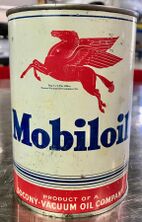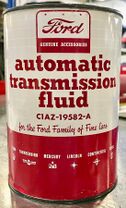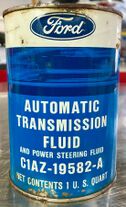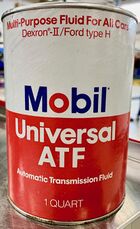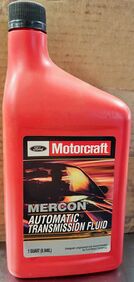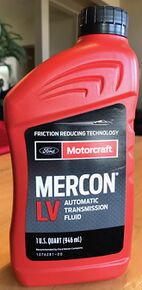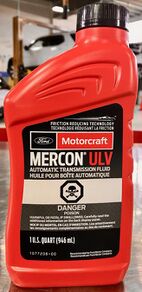MERCON
Topic: Chemistry
 From HandWiki - Reading time: 11 min
From HandWiki - Reading time: 11 min
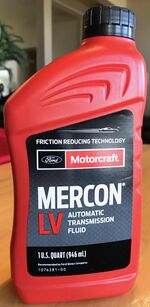 Bottle of Mercon LV ATF | |
| Product type | Automatic transmission fluid |
|---|---|
| Owner | Ford |
| Produced by | Ford |
| Country | U.S. |
| Introduced | 1987 |
| Discontinued | 2007 |
| Related brands | Motorcraft Dexron Chrysler ATM |
Mercon is the trade name for a group of technical specifications of automatic transmission fluid created by Ford. The name is a registered trademark (later becoming a brand) of Ford, which licenses the name and specifications to companies that manufacture the fluid and sell it under their brand names.
Overview
The original Mercon (M2C185-A) Transmission Fluid was introduced in January 1987. Over the years, the original Mercon was supplanted by Mercon "V", Mercon "SP", Mercon LV, and Mercon ULV, which is the latest automatic transmission fluid. Ford has upgraded the Mercon specifications over the years; the newer fluids are not always backward compatible with previous fluids. Newer 6 and 10-speed transmissions as well as Plug-In Hybrid (PHEV), and Electric Vehicle (EV) transmission technologies require specialized fluids to operate properly. There remains a market for older fluids that claim to meet the earlier fluid specifications. See the details below for the backward compatibility of each fluid.
Originally the name MERCON was associated exclusively with automatic transmission fluids, later Ford released MERCON Gear oils and other lubricants under the MERCON brand. Not all Mercon fluids are licensed for reselling under another brand name. All licensed Mercon fluids must have a license number on the container. If no license number is found, the fluid may not be Ford-approved and the automatic transmission fluid cannot be guaranteed to meet Ford specifications. Ford, like many automobile manufacturers, uses transmissions sourced from other suppliers or transmission manufacturers around the world; these transmissions are not manufactured by Ford. Many of these automatic transmissions use unique fluids that might not be shown on this page.
History
Before Mercon: 1942–1987
1942 – Motor Oil
In 1942, The Mercury 8 and Lincoln offered cars with an optional "Liquamatic Drive" using a fluid coupling, conventional clutch, and semi-automatic three-speed transmission. The transmission had an overrunning clutch on the transmission countershaft. The flywheel's fluid coupling used S.A.E 10 motor oil for lubrication. The transmission gearbox used traditional gear oil. This transmission was only produced for a few months before the U.S.A. entered World War II, production of this transmission was not resumed after the war.[1]
1949 – GM Hydra-Matic Fluid
In April 1949, Lincoln began offering the General Motors Hydra-Matic 4-speed automatic transmission in their 1950 model year vehicles. This offering continued through the 1954 model year. Lincoln service information calls for "Lincoln Automatic Transmission Fluid". This fluid met the GM Hydra-Matic Drive fluid specifications.
This Fluid was First Used in the Following Transmissions:
- 1949 Hydra-Matic with an L-9 serial number prefix
- 1950 Hydra-Matic with an L-50 serial number prefix
- 1951 Hydra-Matic with an L-51 serial number prefix
- 1952 Hydra-Matic with an L-52 serial number prefix
- 1953 Hydra-Matic with an L-53 serial number prefix
- 1954 Hydra-Matic with an L-54 serial number prefix
1950 – GM Type "A" Fluid
It is important to understand that every automatic transmission produced by any vehicle manufacturer (Oldsmobile, Cadillac, Buick, Chevrolet, Pontiac, GMC, Ford, Mercury, Lincoln, Chrysler, Dodge, Desoto, Packard, and Studebaker) used GM Type "A" transmission fluids in their transmissions from 1949-1958.
In 1950, 11 years after GM released the Hydra-Matic 4-speed automatic transmission and its special Hydra-Matic Automatic Transmission Fluid, Ford released their first fully automatic transmission; the 1951 Fordomatic 3-speed transmission.[2] This new fully automatic transmission used the GM Type "A" automatic transmission fluid specification. Ford and hundreds of other resellers, became a licensed reseller of the GM Type "A" fluid with an Armor Qualification number. The Type "A" fluid was marketed under the Ford brand name.
This Fluid was First Used in the Following Transmissions:
- 1951 Fordomatic (Borg-Warner FX) 3-Speed automatic transmission
- 1954 Cruise O'Matic (Borg-Warner MX) 3-Speed automatic transmission
- 1955 Lincoln TurboDrive 3-Speed automatic transmission
- 1957 Ford Transmatic Drive 6-Speed Automatic Transmission for Medium-Duty and Heavy-Duty Trucks
- 1958 Cruise-O-Matic 3-Speed automatic transmission
- 1958 Edsel Mile-O-Matic 2-Speed automatic transmission
- 1958 Mercury Multi-Drive
- 1958 Lincoln TurboDrive 3-Speed automatic transmission
1958 – Ford Type "A" Fluid
In 1959, Ford released their own Type-A automatic transmission fluid specification (M2C33-A) and stopped using GM fluid specifications for their in-house transmissions. The Ford M2C33-A fluid had GM Type "A" Suffix "A" characteristics. Transmission fluid service life was fairly short, and frequent transmission oil changes were required.
1959 – Type "B" Fluid
In 1959, Ford released an updated automatic transmission fluid specification Type-B (M2C33-B). The Ford M2C33-B fluid had GM Type "A" Suffix "A" characteristics. As with the previous specification, transmission fluid service life was fairly short, and frequent transmission oil changes were required.
1960 – Type "D" Fluid
In 1960, Ford introduced the Type-D (M2C33-D) specification for service fluid use in 1960 model-year vehicles. This fluid specification change provided better oxidation control, anti-wear performance, and higher static capacity capabilities were also included. Oxidation control of the fluid was measured by a new Merc-O-Matic oxidation test.
This fluid was first used in the following transmissions:
- 1964 C-4 3-Speed automatic transmission
- 1966 C-6 3-Speed automatic transmission
- 1968 FMX 3-Speed automatic transmission
1967 – Type "F" Fluid
In 1967, Ford introduced a new fluid specification, the Type-F fluid (M2C33-F).[3] This fluid provided a high static coefficient of friction which resulted in harsh shifting.
The Type-F fluid specification was intended to produce a “lifetime” fluid that would never need to be changed. This is the first of many Ford “lifetime” fluids. The 1974 Ford Car Shop Manual reads "The automatic transmission is filled at the factory with "lifetime" fluid. If it is necessary to add or replace fluid, use only fluids that meet Ford Specification M2C33F.
1972 – Type "G" Fluid
In 1972, Ford of Europe introduced a new fluid specification, the Type-G fluid (M2C33-G).[4] This fluid was used through 1981.
This fluid was first used in the following transmissions:
- Borg-Warner M35 transmissions and variants
1974 – Type "CJ" Fluid
In September 1974, Ford introduced a new fluid specification, the Type-CJ fluid (M2C138-CJ). This fluid provided smoother shifting and less gear noise by with higher dynamic friction characteristics. The Ford Type-CJ fluid specification also met the GM Dexron-II(D) and earlier fluid specifications. Ford was a licensed GM Dexron-II(D) vendor.
The Ford Type-CJ fluid was compatible with GM Dexron II(D) specifications. This compatibility may suggest to some that all Ford, Mercon, and Dexron fluids are compatible; this is not correct. Always use the factory-recommended fluid for your transmission. (See the Aftermarket Automatic Transmission Fluids section below)
This fluid was first used in the following transmissions:
- 1974 C-3 3-Speed automatic transmission in the Pinto
- 1978 ATX 3-Speed automatic transmission
- 1980 ATX 3-Speed automatic transmission with a Centrifugally Linked Clutch (CLC) in the torque converter
- 1980 Jatco 3-Speed automatic transmission
- 1980 ATX 3-Speed automatic transmission with a Fluid Linked Clutch (FLC) in the torque converter
- 1980 AOD 4-Speed overdrive automatic transmission with torque converter bypass (Ford's first overdrive 4-speed)
- 1983 ZF-4HP33 4-Speed overdrive automatic transmission (Dexron-II(D))
1981 – Type "H" Fluid
As a result of the 1973 OPEC Oil Embargo and fuel shortages, the U.S. government created the Corporate Average Fuel Economy (CAFE) regulations in 1975. The regulations were to be fully implemented by the 1978 model year. The automotive industry responded by changing to three typically unused transmission technologies:
- A 4th gear (overdrive)
- A Torque Converter Clutch (TCC)
- Front Wheel Drive (FWD).
The introduction of the TCC led to customer complaints of a shudder while driving. All vehicle manufacturers made changes to their ATF specifications and the controls of their TCC to try and alleviate the problem. GM released the Dexron-II (D) fluid specification in 1978 and Chrysler released the ATF+2 fluid specification in 1980, and Ford released the Type-H fluid (M2C166-H) specification in June 1981.
The Type-H fluid specification provided improved friction characteristics in lock-up torque converters (reducing shudder during application and release). With this new specification, Ford introduced the aluminum beaker oxidation test (ABOT) to replace the older Merc-O-Matic oxidation test.
The Ford Type-H fluid was compatible with GM Dexron II(D) specifications. This compatibility may suggest to some that all Ford, Mercon, and Dexron fluids are compatible; this is not correct. Always use the factory-recommended fluid for your transmission. (See the Aftermarket Automatic Transmission Fluids section below)
This fluid was first used in the following transmissions:
- 1982 C-5 (C4 with Torque converter Clutch (TCC)) 3-Speed automatic transmission
- 1985 A4LD (C3 with overdrive) 4-Speed automatic transmission
- 1986 AXOD 4-Speed automatic transaxle
- 1986 Electronic A4LD 4-Speed automatic transmission
MERCON Fluids: 1987 – Today
1987 – MERCON
In January 1987, Ford released the original Mercon fluid specification (M2C185-A). Mercon became a trademarked fluid with the qualification and licensing of fluids to ensure quality in the marketplace. This original Mercon Specification was backward compatible with the 1981 Ford Type-H fluid and the 1958 GM Type "A" Suffix "A" fluid.
NOTICE: This version of Mercon was compatible with GM's Dexron-II(D) and later formulations were compatible with Dexron-III(H); however, Future versions of Mercon (Mercon V, Mercon SP, Mercon LV, Mercon ULV) are not compatible with GM's Dexron-III(H) or any newer version of Dexron (Dexron-VI, Dexron HP, Dexron ULV).
This fluid was first used in the following transmissions:
- 1989 E4OD (C-6 with overdrive) Ford's first electronic control 4-speed automatic transmission
- 1990 4EAT-G Mazda 4-Speed automatic transmission
- 1990 F-4EAT 4-speed automatic transmission
- 1990 AXOD-E 4-speed automatic transaxle
- 1992 AOD-E (Electronic AOD) 4-speed automatic transmission
- 1993 AOD-EW/4R70W 4-speed automatic transmission
- 1994 AX4S 4-speed automatic transaxle
- 1994 CD4E Batavia 4-Speed automatic transmission
- 1995 AX4N/4F50N 4-Speed automatic transmission
- 1995 4R44E 4-speed automatic transmission
- 1995 4R55E 4-speed automatic transmission
- 1997 5R44 5-speed automatic transmission (Ford's first 5-speed automatic transmission)
- 1997 5R55 5-speed automatic transmission
1996 – MERCON V
In 1996, Ford released the Mercon "V" fluid specification (M2C202-B).[5] Ford Technical Service Bulletin (TSB) 06-14-04 indicates that Mercon "V" is to replace the original Mercon fluid.[6]
This fluid was first used in the following transmissions:
- 1997 4R70W 4-speed automatic transmission
- 1998 4R100 4-speed automatic transmission
- 2000 4F27E 4-speed automatic transaxle
The Mercon "V" specification was revised in 2002 (M2C919-E). This revised fluid was first used in the following transmissions:
- 2003 4R75E 4-speed automatic transmission
- 2003 4R75W 4-speed automatic transmission
- 2003 5R110W 5-speed automatic transmission
2001 – MERCON SP
In August 2001, Ford released the Mercon "SP" fluid specification (M2C919-D).[7]
Ford SSM 21114 (November 26, 2009) indicates that Mercon Replace "SP" is to be replaced with Mercon LV on Torqshift transmissions from the 2003 through 2008 model years. This SSM does not apply to the ZF 6HP26 transmission.
This fluid first used in the following transmissions:
- 2001 5R110W Torque Shift 5-Speed automatic transmission
- 2005-2008 ZF 6HP26 6-Speed automatic transmission in Lincoln Navigator
2005 – MERCON LV
In December 2005, Ford released the Mercon "LV" fluid specification (M2C938-A).[8]
This fluid was first used in the following transmissions:
- 2006 6R60 ZF 6-Speed automatic transmission
- 2006 FNR5 Mazda 5-Speed automatic transmission
This specification was revised in 2007 for use in the following transmissions:
- 2007 6F50 6-speed automatic transaxle
- 2007 6R80 6-speed automatic transaxle
- 2009 6F35 6-speed automatic transaxle
This specification was revised again in 2010 (M2C938-A2) and was optimized for anti-Squawk performance of clutches. This revised fluid was first used in the following transmissions:
- 2011 6R140 6-speed automatic transmission
- 2013 HF-35 eCVT hybrid transaxle [9]
2014 – MERCON ULV
The fluid specification for Mercon-ULV (Ultra-Low Viscosity) was introduced on January 2, 2014. Mercon ULV is composed of a Group 3+ Base oil and additives needed for the proper operation of the 2017 and above Ford 10R80 and the GM 10L90 10-Speed rear wheel drive automatic transmission.
This transmission and the transmission fluid specification was co-developed by Ford and GM. The current specification that defines the fluid is FORD WSS-M2C949-A.[10] This fluid is also marketed as Dexron ULV.
NOTICE: The quart containers of Mercon ULV must be shaken to stir up the additives before pouring. This fluid is not backward compatible with any previous fluids.
This fluid was first used in the following transmissions:
- 2017 10R80 10-speed automatic transmission
- 2017 6F15 6-speed automatic transaxle
- 2017 6R100 6-speed automatic transmission
Ford "Lifetime" ATF
The 1967 Ford Type-F fluid specification was intended to produce a “lifetime” fluid which would never need to be changed. This was the first of many Ford “lifetime” fluids. The 1974 Ford Car Shop Manual reads "The automatic transmission is filled at the factory with "lifetime" fluid. If it is necessary to add or replace fluid, use only fluids which meet Ford Specification M2C33F. Many other transmission manufacturers have followed with their own "Lifetime" automatic transmission fluids".
Example Maintenance Schedule
|
|
|
|
|
|
Lifetime automatic transmission fluids made from higher quality base oil and an additive package are more chemically stabile, less reactive, and do not experience oxidation as easily as lower quality fluids made from lower quality base oil and an additive package. Therefore, higher quality transmission fluids can last a long time in normal driving conditions (Typically 100,000 miles (160,000 km) or more).
The definition of 'Lifetime Fluid" differs from transmission manufacturer to transmission manufacturer. Always consult the vehicle maintenance guide for the proper service interval for the fluid in your transmission and your driving conditions.
2018 Ford F-150 Example: According to the Scheduled Maintenance Guide of a 2018 Ford F-150 with "Lifetime Fluid" could have three different fluid service intervals depending on how the vehicle is driven:[11]
1. Normal Driving
- Normal commuting with highway driving
- No or moderate load or towing
- Flat to moderately hilly roads
- No extended idling
Under these driving conditions, the automatic transmission fluid needs to be serviced after every 150,000 miles (240,000 km).
2. Severe Driving
- Moderate to heavy load or towing
- Mountainous or off-road conditions
- Extended idling
- Extended hot or cold operation
Under these driving conditions, the automatic transmission fluid needs to be serviced after every 30,000 miles (48,000 km).
3. Extreme Driving
- Maximum load or towing
- Extreme hot or cold operation
Under these driving conditions, the automatic transmission fluid needs to be serviced also after every 30,000 miles.
See also
References
- ↑ MCG (2017-02-07). "Automatic Failure: Ford's 1942 Liquamatic Experiment" (in en-US). https://www.macsmotorcitygarage.com/automatic-failure-fords-1942-liquamatic-experiment/.
- ↑ https://www.sae.org/publications/technical-papers/content/500194/ FORD-MERCURY AUTOMATIC TRANSMISSION
- ↑ "Type F Automatic Transmission Fluid and Power Steering Fluid". https://www.fcsdchemicalsandlubricants.com/Main/product.asp?product=Type+F+Automatic+Transmission+Fluid+and+Power+Steering+Fluid&category=Transmission%20Fluid.
- ↑ Michell, Richard (2011-10-15). Which Oil?: Choosing the right oils & greases for your veteran, brass era, vintage, antique, classic or collector car. ISBN 9781845843656. https://books.google.com/books?id=CgbOuFZx3vwC&pg=PA73.
- ↑ "MERCON V Automatic Transmission and Power Steering Fluid". https://www.fcsdchemicalsandlubricants.com/Main/product.asp?product=MERCON%AE+V+Automatic+Transmission+and+Power+Steering+Fluid&category=Transmission%20Fluid.
- ↑ https://www.aftermarketnews.com/ford-announces-new-replacement-specs-for-mercon-atf/ Ford Announces New Replacement Specs for Mercon ATF
- ↑ "MERCON SP Automatic Transmission Fluid". https://www.fcsdchemicalsandlubricants.com/Main/product.asp?product=MERCON%AE+SP+Automatic+Transmission+Fluid&category=Transmission%20Fluid.
- ↑ "MERCON LV Automatic Transmission Fluid". https://www.fcsdchemicalsandlubricants.com/Main/product.asp?product=MERCON%AE+LV+Automatic+Transmission+Fluid&category=Transmission%20Fluid.
- ↑ https://www.youtube.com/watch?v=hHU5xFOBcsU Ford Hybrid Transaxle Generations
- ↑ "MERCON ULV Automatic Transmission Fluid". https://www.fcsdchemicalsandlubricants.com/Main/product.asp?product=MERCON%AE+ULV+Automatic+Transmission+Fluid&category=Transmission%20Fluid.
- ↑ https://owner.ford.com/tools/account/how-tos/owner-manuals-search-results.html?type=ymm&year=2018&make=Ford&model=F-150 Owner Manuals & WarrantiesTemplate:Permanent dead link
External links
- Transmission fluids (including "Mercon" products) at Motorcraft
- A Look at Changes in Automatic Transmission Fluid
- The History of Automatic Transmission Fluid - ATF History Part 1
- 69 Years of Ford Automatic Transmission Fluid - ATF History Part 3
- Changing Gears: The Development of the Automotive Transmission
- Ford Service Information Subscription Access
 |
 KSF
KSF